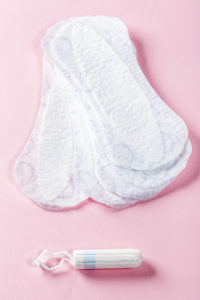By Brooke Davidoff

For about half the population, periods are not optional: they are unavoidable and they are expensive. Not everyone has the financial stability to afford menstrual products monthly. Period cycles and spotting can, at times, be completely unpredictable. Adolescent and adult menstruating people both in school and at work should not be held back from everyday functions by their periods or the related financial strain.
On Menstrual Hygiene Day on May 28 this year, Congresswoman Grace Meng from Queens, New York, introduced a plan to end period poverty—sparking a movement to reach gender equity goals including:
– everyone being able to access and afford the menstrual products of their choice
– ending period stigma
– everyone having basic information about menstruation (not just those who menstruate)
Difficulties in accessing menstrual products are a direct result of patriarchal oppression—this is a gender equity issue. “Two-thirds of low-income women surveyed in one 2019 study say they did not have the resources to buy hygiene products at some point in the last year, and one-fifth of those surveyed say they have difficulty accessing those products on a monthly basis. One in five girls have reported missing school because of a lack of menstrual products.”
Although, it would probably be more accurate to call this a sex equity issue. Menstrual products are a necessity for most people assigned female at birth. Ignoring this necessity is inequitable. A lifetime of menstrual products is expensive, irregular periods can cause bleeding more than once a month or when it is unexpected, and the fear of bleeding through your clothes can cause a burden of stress and anxiety.
But, there is good news! On October 12 of this year, California Governor Gavin Newsom passed The Menstrual Equity for All Act in California. The bill will go into effect next school year and it stipulates that free menstrual products must be made available in the bathrooms of all public schools serving students in grades six through twelve, all community colleges, and all California State University System schools.
Furthermore, while no similar legislation has passed in Missouri, The University of Missouri Kansas City also supplies free menstrual products in multiple locations! The Women’s Center (105 Haag Hall) has a collection of options. The Health Science Library on Hospital Hill also has supplies available, and even The Kangaroo Pantry offers free menstrual products–check their website for available hours and locations!